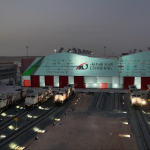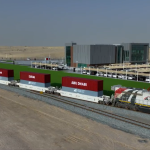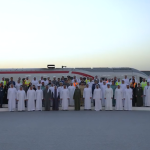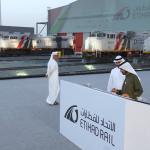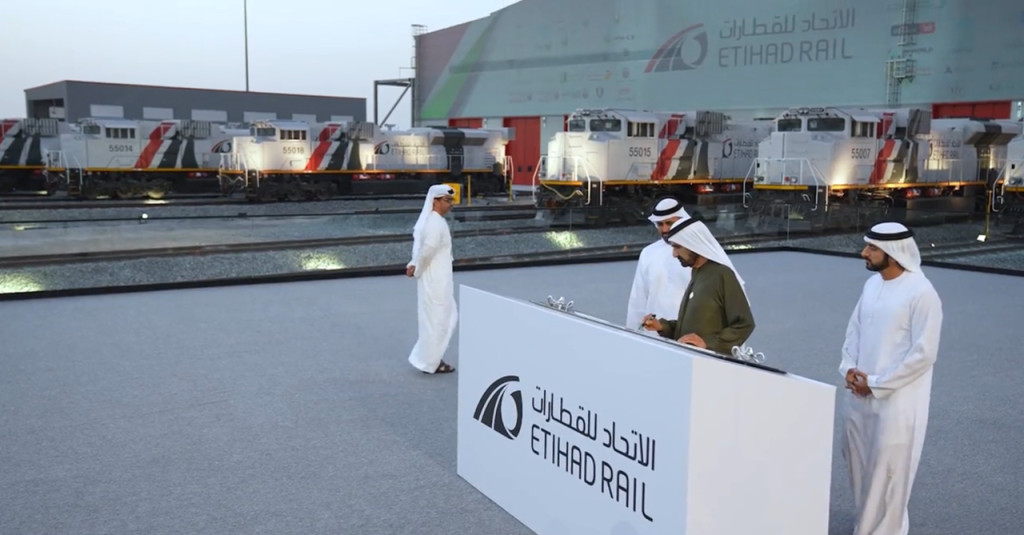 The Prime Minister of the United Arab Emirates Sheikh Mohammed bin Rashid and Sheikh Theyab bin Mohamed bin Zayed Al Nahyan, Chairman of Etihad Rail announced the completion of the 900 km UAE rail network which now links the seven emirates.
The Prime Minister of the United Arab Emirates Sheikh Mohammed bin Rashid and Sheikh Theyab bin Mohamed bin Zayed Al Nahyan, Chairman of Etihad Rail announced the completion of the 900 km UAE rail network which now links the seven emirates.
The ceremony, that was attended by several ministers and senior officials, was held at the main centre for control and maintenance, in Al Fayah region, Abu Dhabi, on 23 February 2023 when cargo train operations have been launched to connect the entire country.
“We announce the inauguration operation of the freight trains throughout the UAE with a fleet of 38 locomotives and more than 1,000 wagons capable of transporting all types of goods. Emirati talents, with the support of the UAE leadership, have turned the dream of our founding fathers into reality. Thanks to them we won the bet, and we succeeded in launching a railway network with international specifications,” Sheikh Theyab said at the inauguration.
The main line of the UAE rail network extends from Ghuweifat, west of the Abu Dhabi emirate, on the border of the Kingdom of Saudi Arabia, to Fujairah, on the UAE’s east coast, forming an essential part of the global supply network.
The network is crossing through a variety of geographical terrains and includes 593 bridges and crossings of all types, and 9 tunnels with a length of 6.5 km. It took 120 million cubic meters of excavation work to complete, to ensure the highest levels of vehicular traffic flow under the tracks of the railway network. The 1,435 mm rail system is equipped with the ETCS level 2 signalling system and is designed to withstand the geographical nature, climatic conditions, high temperatures and humidity in the GCC region, to ensure high levels of performance, efficiency and sustainability.
The freight trains have a capacity to transport 60 million tonnes of cargoes annually, running at a speed of up to 120 km/h. Each goods transport’s locomotive operates with a power of 4,500 horsepower, equivalent to 3,400 kilowatts. The standard width of the rail is 1,435 metres, and it operates under the European ETCS level 2 signalling system.
The freight trains will connect 4 major ports and 7 logistics centres across the country. The network also includes a number of charging stations located in Ruwais, Industrial City of Abu Dhabi (ICAD), Khalifa Port, Dubai Industrial City, Jebel Ali Port, Al Ghail and Fujairah Port. These locations are a major hub for local and regional distribution and logistics services, as it includes customs warehouses and on-site cargo inspection services.
The stage one of the network has been fully operational since January 2016, and the construction of the stage two of the project started in early 2020.
The project has contributed to supporting the local industry by assigning 215 companies and local entities. Also, 70% of the building materials used in the project are produced by the local industry. 11 contractors, 25 consultants, and 28,000 specialists worked on the project that took 133 million working hours to complete, and 40,000 approvals from 180 government agencies.
Share on:



